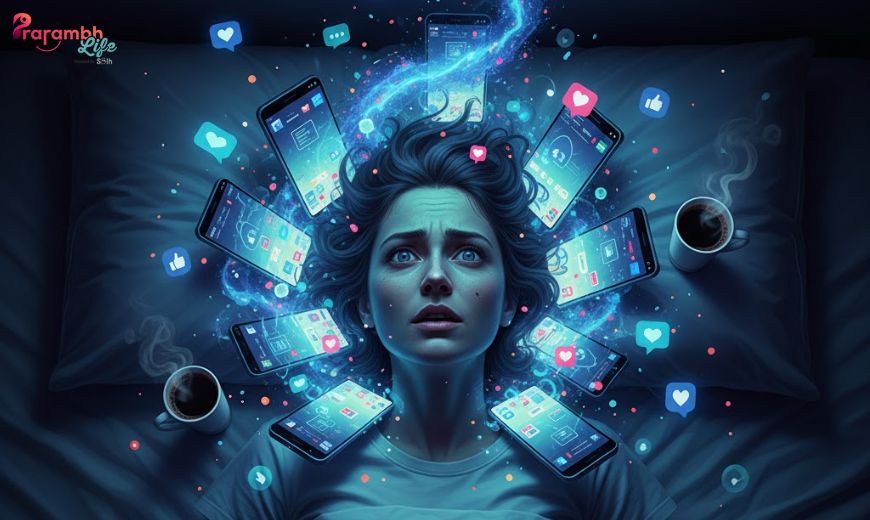
We live in a world that glorifies exhaustion.
“Sleep is for the weak,” we say — as if bragging about burning the midnight oil somehow makes us stronger. But here’s the truth no one likes to admit: lack of sleep doesn’t just drain your energy — it rewires your brain, deepens your stress, and quietly feeds addiction.
Whether it’s caffeine, nicotine, late-night screen scrolling, or alcohol to “unwind,” most of us are stuck in a pattern that feels impossible to break.
Sleep deprivation and addiction don’t just coexist — they fuel each other, creating a cycle that often requires a structured De-addiction program to break free from.
The Science Behind the Spiral
When you sleep, your brain resets — it processes emotions, balances hormones, and repairs the circuits responsible for judgment and self-control.
But when you cut sleep short — even by a couple of hours — the brain loses its ability to regulate cravings and impulses.
Here’s what happens:
The prefrontal cortex, your rational decision-maker, slows down.
The amygdala, your emotional center, goes into overdrive.
Cortisol, the stress hormone, spikes — making you anxious, restless, and irritable.
So, what does the brain do? It looks for quick relief. A drink. A cigarette. A late-night scroll session. Something — anything — that numbs the fatigue.
And in that moment, addiction finds its doorway, often leading individuals toward a De-addiction program for long-term healing.
How Addiction Steals Sleep (and Keeps You Hooked)
Sleep loss often triggers addiction — but addiction, in turn, worsens sleep quality.
It’s a vicious, self-sustaining cycle that quietly dismantles your physical and mental well-being.
Here’s how it plays out:
Caffeine and stimulants keep you wired even after their job is done.
Nicotine disrupts REM sleep, leaving your brain unrested.
Alcohol makes you drowsy initially, but fragments deep sleep, leaving you tired the next day.
Screens and blue light trick your brain into staying alert, suppressing melatonin.
Over time, you stop feeling “rested” at all — just functional enough to get through the day, propped up by your next cup, puff, or scroll.
A guided De-addiction program can help identify these triggers and rebuild your natural sleep rhythm.
The Emotional Fallout
It’s not just physical.
Sleep deprivation blurs emotional boundaries, making stress feel heavier and reactions more impulsive. The line between “coping” and “escaping” becomes dangerously thin.
That’s why many young professionals end up in what psychologists call functional addiction — performing well externally, but relying on external crutches to stay balanced.
The worst part? You don’t even realize how bad it’s gotten until you try to stop — and that’s where a structured De-addiction program becomes essential for sustainable recovery.
Breaking the Cycle: Where Recovery Truly Begins
The answer isn’t just more willpower — it’s more awareness.
You can’t fix what you don’t see.
Recognizing that sleep deprivation and addiction feed off each other is the first step to regaining control.
Here’s how you can begin:
Reclaim your nights. Set a non-negotiable sleep time — even on weekends.
Audit your coping tools. Ask yourself: “What do I reach for when I’m tired or stressed?”
Replace stimulation with restoration. Meditation, reading, or simply sitting in silence can reset your nervous system more effectively than a substance ever could.
Track your stress and sleep patterns. You’ll start noticing what triggers your spiral.
Combining these with a personalized De-addiction program accelerates healing and builds long-term balance.
How Prarambh Life Can Help
At Prarambh Life, we recognize that recovery isn’t just about breaking addiction — it’s about healing the lifestyle patterns that feed it.
Our programs are designed to blend AI-based insights with psychological healing, helping you reconnect with your body’s natural rhythm and emotional balance.
The 3-Month Program – Awareness & Correction
Perfect for those who are beginning to notice burnout creeping in.
It helps you:
- Identify stress patterns with AI-powered Streffie.
- Build restorative sleep routines.
- Learn emotional regulation through guided exercises.
- Find accountability through peer support.
The 6-Month Program – Deep Reset
Ideal for individuals already caught in the sleep-addiction loop.
It focuses on:
- Cognitive restructuring: Training your brain to resist unhealthy impulses.
- Relapse prevention: Understanding your personal triggers.
- Holistic recovery: Combining mindfulness, sleep hygiene, and emotional therapy for long-term stability.
Because real recovery isn’t just about quitting — it’s about restoring rhythm through a supportive De-addiction program.
For Working Professionals and Youth Alike
This isn’t just a student problem or a 9-to-5 burnout story — it’s a generational pattern. We’re overstimulated, under-rested, and endlessly connected.
But breaking free doesn’t mean quitting everything that comforts you. It means understanding why you seek comfort — and finding healthier ways to restore peace.
Sleep is not a luxury. It’s your body’s most powerful detox — from both toxins and toxic habits.
The Bottom Line
The connection between sleep deprivation and addiction is not coincidence — it’s chemistry.
Your body can only fight so long without rest before it starts seeking shortcuts.
And while substances or behaviors offer temporary relief, true restoration begins with sleep, balance, and support.
Prarambh Life offers exactly that — a bridge between science and empathy, technology and healing. Because you don’t need to wait for a breakdown to begin recovery.
All it takes is one decision — to sleep, to pause, and to start over.
🌙 Your recovery starts with rest. Explore Prarambh Life’s addiction recovery programs — available in English and Hindi, starting at ₹999/month.

